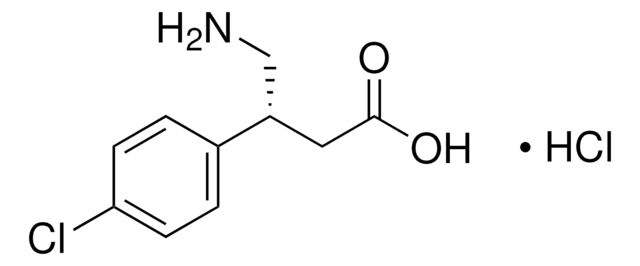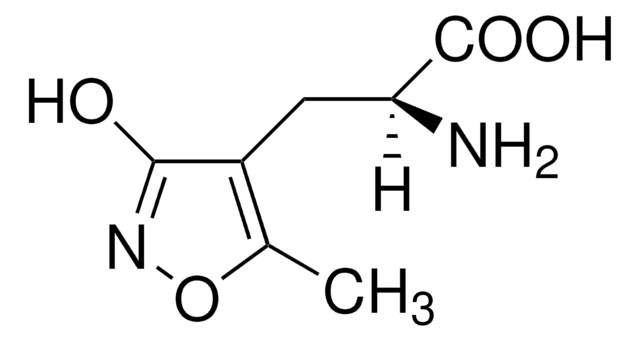M1523
Muscimol
≥98% (TLC), powder, GABAA receptor agonist.
Sinónimos:
3-Hydroxy-5-aminomethyl-isoxazole, 5-Aminomethyl-3-hydroxy-isoxazole, 5-Aminomethyl-3-isoxazolol, Agarine, Pantherine
About This Item
Productos recomendados
product name
Muscimol, powder
form
powder
Quality Level
color
white to off-white
storage temp.
2-8°C
SMILES string
NCC1=CC(=O)NO1
InChI
1S/C4H6N2O2/c5-2-3-1-4(7)6-8-3/h1H,2,5H2,(H,6,7)
InChI key
ZJQHPWUVQPJPQT-UHFFFAOYSA-N
Gene Information
rat ... Gabra2(29706)
¿Está buscando productos similares? Visita Guía de comparación de productos
General description
Application
- to reduce conditioned fear-expression in lateral amygdala (LA)
- to eliminate cortical cell response in ferrets
- to inactivate lateral magnocellular nucleus of the nidopallium (LMAN) in zebra finches
Biochem/physiol Actions
Features and Benefits
signalword
Danger
hcodes
Hazard Classifications
Acute Tox. 2 Oral - STOT SE 3
target_organs
Central nervous system
Storage Class
6.1A - Combustible acute toxic Cat. 1 and 2 / very toxic hazardous materials
wgk_germany
WGK 3
flash_point_f
Not applicable
flash_point_c
Not applicable
ppe
Eyeshields, Faceshields, Gloves, type P2 (EN 143) respirator cartridges
Certificados de análisis (COA)
Busque Certificados de análisis (COA) introduciendo el número de lote del producto. Los números de lote se encuentran en la etiqueta del producto después de las palabras «Lot» o «Batch»
¿Ya tiene este producto?
Encuentre la documentación para los productos que ha comprado recientemente en la Biblioteca de documentos.
Los clientes también vieron
Artículos
DISCOVER Bioactive Small Molecules for Neuroscience
DISCOVER Bioactive Small Molecules for Neuroscience
DISCOVER Bioactive Small Molecules for Neuroscience
DISCOVER Bioactive Small Molecules for Neuroscience
Nuestro equipo de científicos tiene experiencia en todas las áreas de investigación: Ciencias de la vida, Ciencia de los materiales, Síntesis química, Cromatografía, Analítica y muchas otras.
Póngase en contacto con el Servicio técnico












